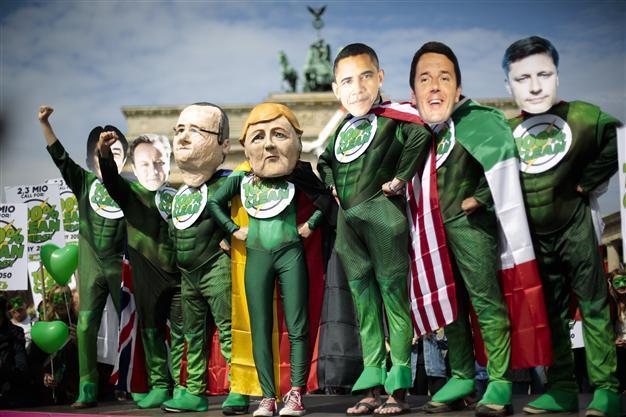Merkel under pressure on coal ahead of G7 climate push
BERLIN - Agence France-Presse

Climate activists in green costumes and with masks of the G7 leaders Japanese Prime Minister Shinzo Abe, Britain's Prime Minister David Cameron, French President Francois Hollande, German Chancellor Angela Merkel, US President Barack Obama, Italian Prime Minister Matteo Renzi and Canadian Prime Minister Stephen Harper, from left, attend a protest in front of the Brandenburg Gate near a building hosting the 'Petersberg Climate Dialogue' conference in Berlin, Germany, Tuesday, May 19, 2015. AP Pho
Chancellor Angela Merkel is hoping to send a robust message on climate change from a G7 summit this weekend but may be undermined by Germany's own heavy dependence on coal.
Europe's top economy sees itself as a pioneer among industrialised nations for its "energy transformation" pushing the development of renewables while phasing out nuclear power.
However the ambitious drive, prompted by Japan's Fukushima nuclear disaster in 2011, has extended its reliance on coal, particularly the country's own enormous lignite deposits.
Environmentalists aim to use the G7 huddle starting June 7 at Bavaria's Elmau Castle to hold Merkel's feet to the fire over Germany's dirty and abundant coal-fired plants even as she seeks ambitious climate pledges from the club of rich nations.
Looking ahead to the summit, Greenpeace launched protests across Germany last weekend under the banner "Climate Chancellor or Coal Chancellor?" demanding that Merkel take a stand on a decisive issue in the climate debate.
Given its low price and a broken European system of carbon emissions trading, coal remains the primary source of electricity in Germany, accounting for 45 percent of gross production.
The issue has even torn at the fabric of her left-right "grand coalition" government between Merkel's conservatives and the Social Democrats.
Environment Minister Barbara Hendricks, a Social Democrat who is fighting for a reduction in coal use, summed up the paradox recently: "No country can enter into international climate talks credibly if it has failed to even reach its own targets."
Tobias Muenchmeyer of Greenpeace Germany agreed that if the chancellor wants to draw concessions from other countries, she must have her own house in order.
Merkel "will leave for Elmau weakened unless she ends the fight over coal," he said.
She will host the two-day meeting under the rotating G7 presidency with the leaders of Britain, Canada, France, Italy, Japan and the United States with reduction of dangerous greenhouse-gas emissions high on the agenda.
Merkel was called the "Climate Chancellor" by the German media in 2007 during the last German presidency for the priority she gave to the issue.
Significant progress during this year's summit, helping to pave the way to a UN climate pact at a meeting in Paris in December, would be a handsome feather in her cap after a decade in power.
But for Germany to reach its goal of reducing carbon dioxide emissions by 2020 by 40 percent compared to 1990 levels, Hendricks and Vice Chancellor Sigmar Gabriel, leader of the Social Democrats, want to see the owners of the oldest coal-fired plants taxed to cover the pollution they emit.
The ultimate goal is to eliminate the competitive advantage of cheap coal, forcing the dirtiest plants to close and making renewables more competitive.
But the energy industry has mounted ferocious opposition to the scheme, raising the spectre of tens of thousands of lost jobs.
The coal sector currently employs more than 30,000 people in Germany in regions including the Ruhr Valley and Lusatia in former East Germany where prospects for another industry to supplant it look decidedly bleak.
Lili Fuhr, a climate expert at the Heinrich Boll Foundation, a think-tank close to the opposition Greens party, said this regional economic factor explained much of Merkel's reticence.
Germany's Environmental Protection Office estimates potential job losses from a government-driven shift away from coal at fewer than 5,000, far below the 100,000 expected by the giant service sector trade union Verdi.
A watered-down version of Gabriel's plan that is already circulating in Berlin would put less of a burden on the coal sector to reduce greenhouse gas emission while demanding more of other industries.
But environmentalists insist Germany cannot hope to meet its 40 percent target without tackling its coal dependence head-on.
Merkel has stayed on the fence in the debate but her CDU party has come out overwhelmingly against the coal tax.
Muenchmeyer of Greenpeace hopes that by June 7, Merkel will throw her weight behind the new levy, which he said could touch off "positive chain reactions" this weekend in Elmau.
